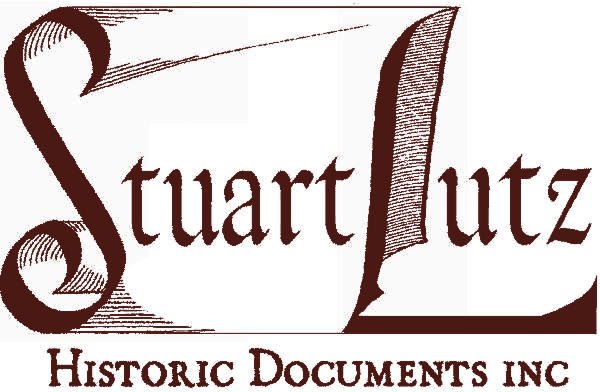| |
 JOSEPH BLOOMFIELD JOSEPH BLOOMFIELD |
|
|
|
|
| |
Price: $450.00 |
Stock# 4310 |
| |
NEW JERSEY SUPREME COURT DOCUMENT SIGNED BY THREE REVOLUTIONARY WAR-ERA NEW JERSEY POLITICIANS, INCLUDING TWO FUTURE GOVERNORS
JOSEPH BLOOMFIELD (1753-1823). Bloomfield was a New Jersey lawyer and Revolutionary War soldier. He was Governor of New Jersey from 1801 to 1812. During the War of 1812 he was commissioned as a brigadier general and served until 1815.
RICHARD HOWELL (1754-1802). Howell was the third Governor of New Jersey, serving from 1794 to 1801.
ISAAC SMITH (1740-1807). Smith was a New Jersey Supreme Court Justice from 1777 to 1804.
DS. 1pg. November 1789. A legal document signed “Isaac Smith”, “Richard Howell”, and “Joseph Bloomfield” by three New Jersey politicians. Smith signed as an associate justice of the New Jersey Supreme Court; Howell and Bloomfield would later become Governors of New Jersey. The document concerns a real estate issue decided by the New Jersey Supreme Court. The document is written on vellum that has wrinkled along the left side. Some of the writing is affected. |
4310
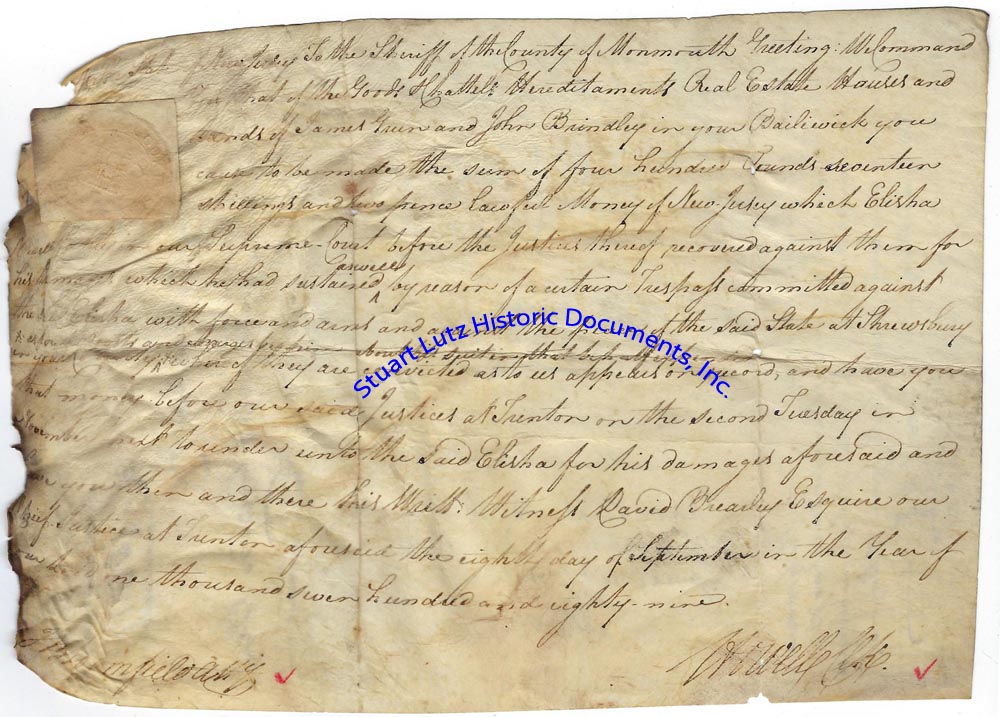
|
|
| |
| |
 JOHN CAMPBELL JOHN CAMPBELL |
|
|
|
|
| |
Price: $350.00 |
Stock# 5988 |
| |
BRITISH REAR ADMIRAL JOHN CAMPBELL WRITES SHORTLY AFTER END OF AMERICAN REVOLUTION ON CONTINUED NAVAL TENSION BETWEEN AMERICA AND GREAT BRITAIN: “REQUEST THAT YOUR LORDSHIP WILL BE PLEASED TO FURNISH ME WITH INSTRUCTIONS HOW TO ACT IN THIS AFFAIR”
JOHN CAMPBELL (1720-1790). Campbell was a British naval officer rising to the rank of Rear Admiral, navigational expert, and colonial governor of Newfoundland.
LS. 2 pg. 7” x 10”. July 28, 1783. Leicester fields. A letter signed “Jn: Campbell” to “Right Honble Lord North”: “My Lord Having been informed by Mr. William Newman a Principal Merchant trading to Newfoundland that an American vessel arrived at St. John’s from Boston in May last, laden with Rice and Flour And that the Customhouse had refused to admit her to an Entry and come to a resolution of detaining her until the Governor’s arrival; I think it my Duty to communicate to your Lordship this information and to request that your Lordship will be pleased to furnish me with Instructions how to Act in this Affair”. This letter from John Campbell, the Governor of Newfoundland, to Frederick North, British Home Secretary, reflects the continued distrust and disagreement between Britain and the United States as the American Revolution came to a formal resolution. Lord North served as British Prime Minister through the Battle of Yorktown, which brought down his government. In his subsequent role as Home Secretary, North was tasked with helping to complete what would become the Treaty of Paris. Though the treaty would grant shared access to the Mississippi River and American fishing rights near Newfoundland, continued British military presence near the Great Lakes and harassment of American commercial vessels in the Atlantic perpetuated tension between Great Britain and the United States for the next few decades. This tension resulted in the polarizing Jay Treaty and Embargo Act and culminated in the War of 1812. The letter is in fine condition with the first page of the letter being toned. |
5988
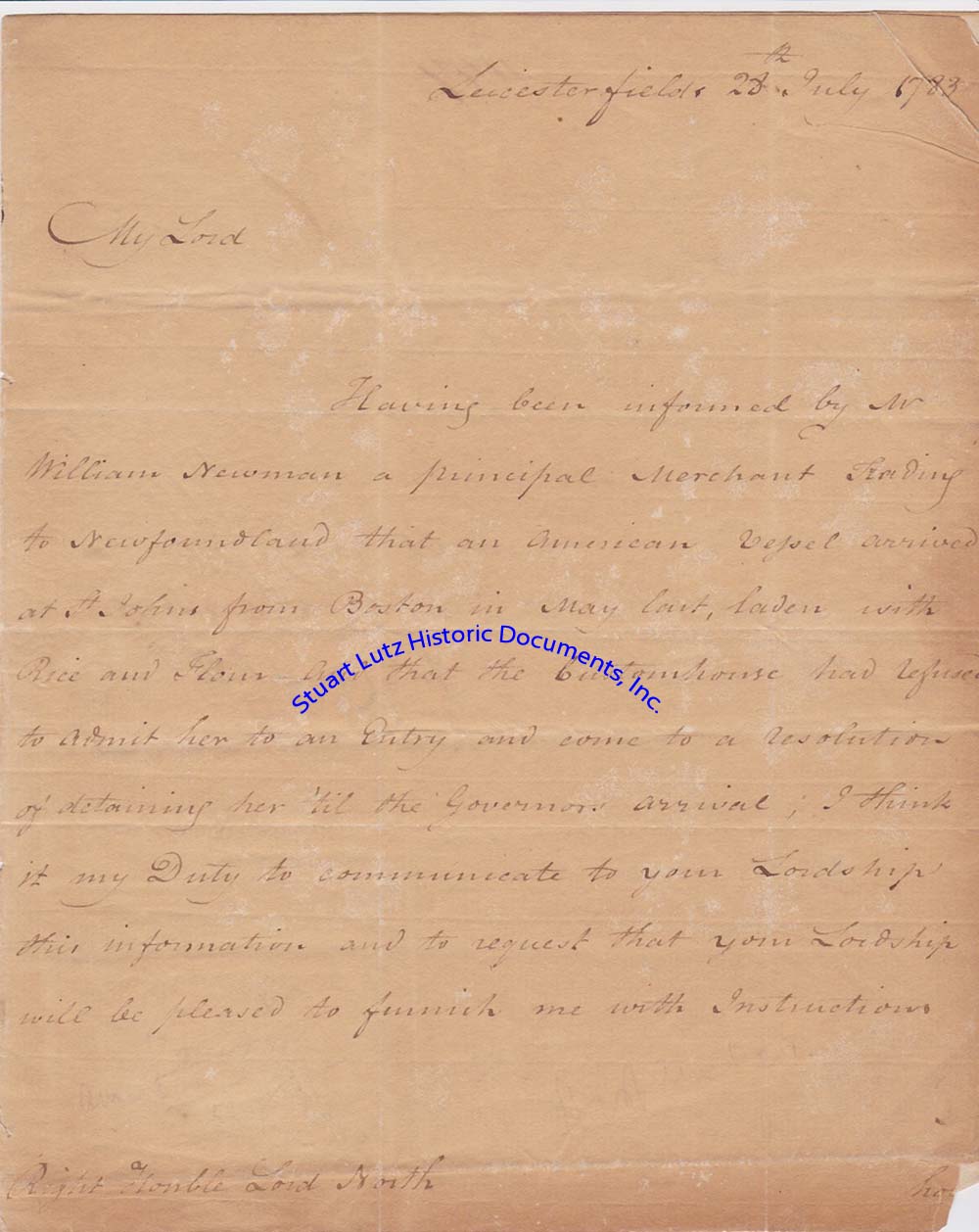
|
|
| |
| |
 JEAN DE LAMBERVILLE JEAN DE LAMBERVILLE |
|
|
|
|
| |
Price: $2,500.00 |
Stock# 5908 |
| |
THE RARE AUTOGRAPH OF JEAN DE LAMBERVILLE, THE FRENCH JESUIT MISSIONARY WHO WORKED WITH THE FIVE NATIONS
JEAN DE LAMBERVILLE (1633-1714). Lamberville was a French Jesuit priest who landed in New France in 1669 and was largely stationed in Montreal. He was an important missionary to the Onondagas and converted their chief, and he was a conduit between the Five Nations and the European settlers. He was one of the most influential Frenchman in the New World.
ADS. 1pg. 7 ½” x 5 ½”. July 15, 1705. Paris. An autograph document signed “Jean De Lamberville” twice, once in the text and once at the conclusion. Writing in French, Lamberville penned: “I, the undersigned Jean De Lamberville, priest of the company of Jesus and attorney of the mission of said company in New France, called Canada, in North America, confess to have received of the sum of eighty livres for the last six months of the year 1705 on account of 800 livres rent [government obligation], belonging to said mission and issued on the 7th of January 1682. For the said eighty livres I discharge Mr. Layeur and all others. Done at Paris the fifteenth of July, 1705. Jean De Lamberville SJP”. Father Lamberville likely returned to France around 1700 and remained in France for the rest of his life. The statement is written on vellum and has a red wax seal in the lower right corner that was largely removed. There is a stamp at the top stating that it came from the Department of Rents in Paris, and a small circular hole in the exact center of the document where two folds merged. Generally, autographs of New World missionaries are very difficult to find. According to the RareBookHub, the last Lamberville signed document to sell at auction occurred in 1924, attesting to their rarity. |
5908
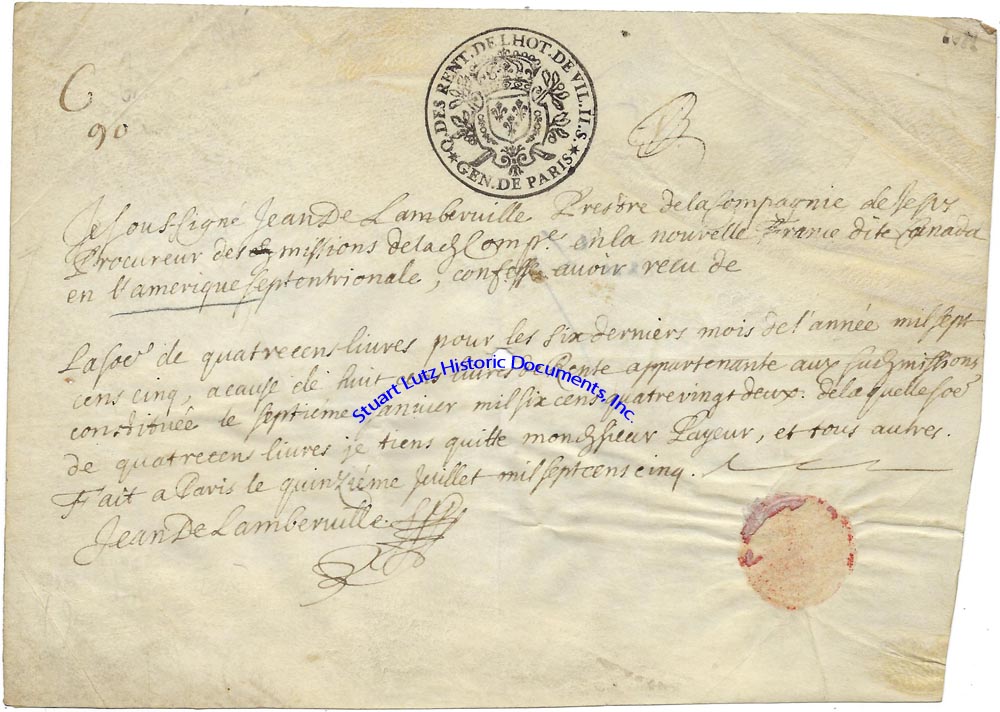
|
|
| |
| |
 JOSEPH DWIGHT JOSEPH DWIGHT |
|
|
|
|
| |
Price: $400.00 |
Stock# 4494 |
| |
GENERAL DWIGHT WRITES TO A LIEUTENANT ABOUT BACK PAY FOR MILITARY SERVICE: “I HAVE SOME MONEY DUE IN YOUR COUNTY…I’LL ENDEAVOR TO SETTLE IT WITH YOU TO YOUR SATISFACTION AND PRAY YOU NOT TO GIVE YE CAPT ANY TROUBLE ABOUT IT”
JOSEPH DWIGHT (1703-1765). In colonial Massachusetts, Dwight was a military general during the French and Indian War and the Chief Justice of the Berkshire County Court of Common Pleas.
ALS. 1pg. 7 ½” x 12 ½”. September 10, 1752. Brookfield [Massachusetts]. An autograph letter signed “Joseph Dwight” to Lieutenant Dickinson of Hatfield. He wrote “As I had promised to Capt Keyes to answer his Debt to you I fully intended to have Settled the affair with you when I was last at Hatfield but little disappointment and another prevented, I have some money due in your county, If I can get it shall pay you soon but be that is it will, I’ll endeavor to settle it with you to your Satisfaction and pray you not to give ye Capt any Trouble about it. I am Sir your assured Friend & hble Servt Joseph Dwight”. The letter has the address on the verso. The letter has light soiling and margin chipping, but is in fine condition. |
4494
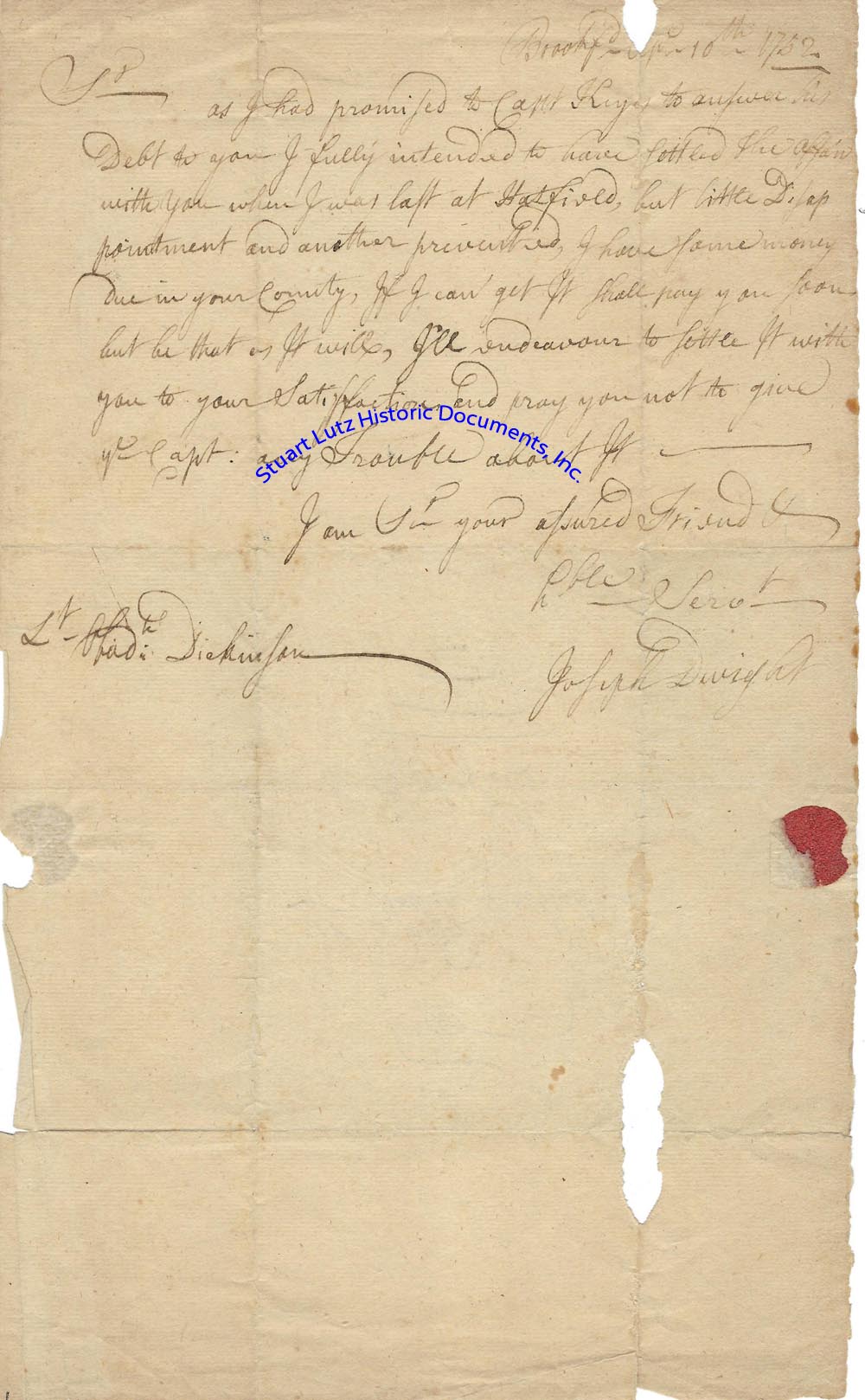
|
|
| |
| |
 TIMOTHY DWIGHT TIMOTHY DWIGHT |
|
|
|
|
| |
Price: $250.00 |
Stock# 5981 |
| |
EXCERPT OF YALE COMMENCEMENT ADDRESS BY TIMOTHY DWIGHT IV, FUTURE PRESIDENT OF THE COLLEGE
TIMOTHY DWIGHT IV (1752-1817). Dwight was an American educator, Congregationalist minister, author, and the 8th President of Yale College from 1795-1817.
D. 9 pages. 6” x 9”. July 25, 1776. Yale. A contemporary copy of “The following passages excerpted from Dr. Dwight’s valedictory address to the young Gentlemen who commenced Bachelors of Arts at Yale College July 25th, 1776, are strongly characteristic of the spirit & sentiment which has made the United States of America a great and independent and industrious & Virtuous Nation”. This is a draft of the commencement address of Dr. Timothy Dwight IV, who was then a tutor at Yale College. The full remarks can be found transcribed online, but this document includes key passages in near-final form from the first half and the concluding paragraph. Delivered just weeks after the signing of the Declaration of Independence, Dwight’s speech highlights the strength of this new nation and the necessity of the graduates to preserve and lead it. The scribe is unknown: “Were all these blessings bestowed on a country, which, like many in the world, was incapable of enjoying them generally, by reason of a destitution of convenience for navigation and commerce, a principal part of their value would be lost. But heaven, resolving that all the circumstances of this continent should be of a piece, has blessed it with naval and commercial advantages, superior to those of any state on earth. Its seacoasts reach on both sides many thousands of miles. Its harbours [sic] are safe, spacious, and innumerable. From these an easy, advantageous and unlimited intercourse may be extended to every corner of the globe…But all this is insufficient to complete the felicity of a country. If even these blessings; great as they are, were insecure; if they were naturally exposed to the ravages of enemies, and the desolations of war, the inhabitants would be miserable, amid all the indulgence of heaven. But to finish the superiority of North-America over every other country, the MOST HIGH has replenished it with every source of strength and greatness. Its present circumstances, which arise from events altogether political and accidental, are no objection to this account. For a war like this cannot with any probability be a second time expected. I proceed therefore to observe that, beside the inconceivable wealth and power, which must necessarily roll in upon this infant empire, from an unbounded commerce, our internal supplies are of every kind; and inexhaustible”. Dwight later argues that a chief benefit of the United States is homogeneity amongst its people: “I proceed then to observe that our part of the American Continent…is inhabited by a people, who have the same language manners & interests & the same essential principles of civil government”. Yet even with this promise, happiness and prosperity can only be perpetuated if citizens like the graduates serve their new nation: “Let us therefore by Virtue & perseverance in what is wise & good endeavor to cooperate with this brilliant design and to hasten the days where there shall no longer be any war, and when Man shall be taught to know and to feel what this chief happiness has in the works of Industry & Peace and in the composement [sic] of the Arts of Benevolence…” This speech, even if not in final form, is a great example of early American rhetoric by a prominent American religious leader. The document is in fine condition. |
5981
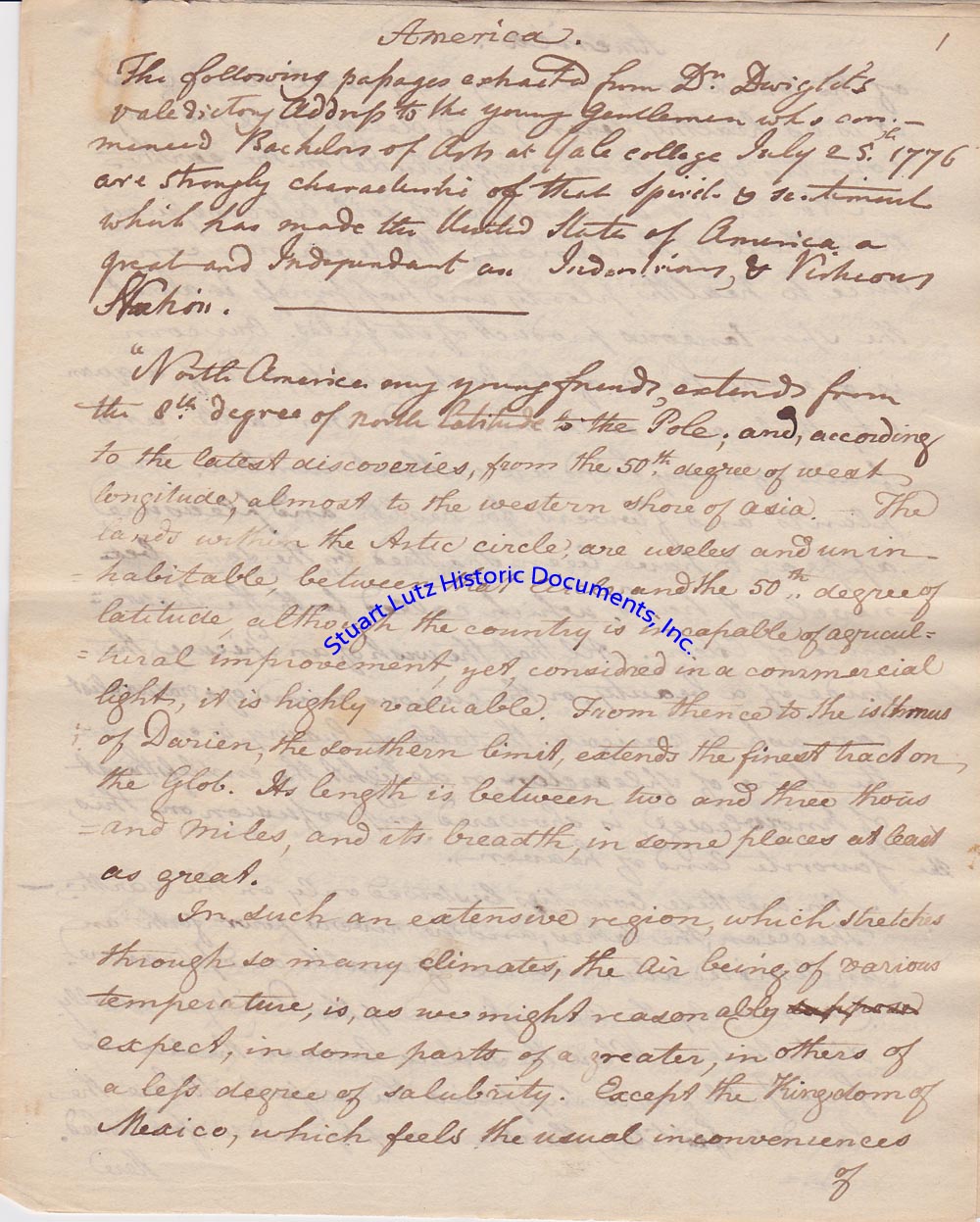
|
|
| |
| |
 THOMAS FITCH THOMAS FITCH |
|
|
|
|
| |
Price: $250.00 |
Stock# 5368 |
| |
A THOMAS FITCH V FINANCIAL DOCUMENT MENTIONING JONATHAN TRUMBULL
THOMAS FITCH V (1725-1795). Fitch was a Revolutionary War-era Connecticut politician.
ADS. 1pg. March 1768. An autograph document signed “Fitch” as a member of the colonial Connecticut House of Representatives. This brief financial document mentions Johnathan Trumbull Sr. (1710-1785), who was soon to become Colonial Governor of Connecticut: “Sir Col. Huntington has accounted with me … in Oct 1765 amounting to £27 u 2 u 6 which you will please charge me with in the Company Books…Fitch To Mr Jos. Trumble”. The document is in very good condition and has folds. |
5368
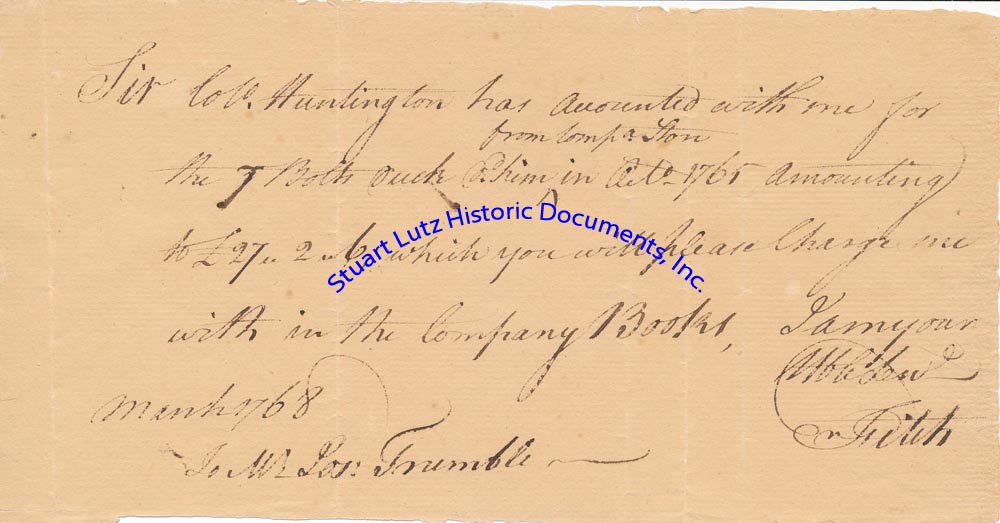
|
|
| |
| |
<Previous 6> <Next 6>
|
 |
